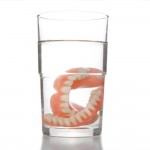
Good denture hygiene is important to remove biofilm, prevent stomatitis and maintain good oral health. Brushing is the most commonly approach preferably with a non-abrasive toothpaste but chemical methods using alkaline peroxide effervescent tablets, lauryl sulphate solutions, 0.5% sodium hypochlorite (NaOCl), or 0.2% chlorhexidine have been shown to reduce microorganism colony-forming units are also used. Other approaches including the use of ultrasonic cleaning, microwaves and photodynamic therapy have also been used as adjuncts.
The aim of this review was to evaluate the effectiveness of effervescent tablets in the cleaning and sanitising of removable prostheses compared with other methods.
Methods
The reviewers registered a protocol with the PROSPERO database. Searches were conducted in the Medline/PubMed, Scopus, Embase, Web of Science and Cochrane clinical trials databases. Randomised and non-randomised controlled trials on the use of effervescent tablets alone or in combination compared against other methods and combinations of mechanical or chemical cleaning or against a control were considered. Pairs of reviewers independently selected the studies and extracted data. Risk of bias was assessed by pairs of reviewers using the Cochrane risk of bias tool (RoB2). The physiotherapy evidence database (PEDro) scale was used to analyse the internal validity. A narrative synthesis and meta-analyses were undertaken.
Results
- 23 RCTs published between 1984 and 2021 were included.
- Comparisons mainly combined brushing with use of tables of different brands and composition.
- 11 studies assessed amount of biofilm, 11 studies the presence of candida, studies assessed colour and surface roughness and one study dimensional stability.
- 16 RCTs were considered to be at high risk of bias, 3 at low risk and 4 at unclear risk.
- Meta-analysis (4 studies, 141 patients) found a larger reduction in plaque for brushing and tablet group use compared with brushing alone group, Mean Difference (MD) = -1.92 (95%CI; -3.45 to -0.38).
- Meta-analysis (3 studies, 94 patients) showed a larger reduction in total bacteria level brushing and tablet group use compared with brushing alone group, MD = -4.43 (95%CI; -8.29 to -0.55).
- Meta-analysis (3 studies, 98 patients) showed a larger reduction in Candida or fungal levels in those using a combination of brushing with tablets. MD = -0.78 (95%CI; -1.19 to -0.37).
Conclusions
The authors concluded: –
The combination of brushing and the use of effervescent tablets versus brushing alone had a significantly higher effect on reducing biofilm and bacterial counts and a moderate effect on reducing Candida. Regarding colour and dimensional stability, few studies were found, with the results depending on the concentration of the product and the immersion time of the device.
Comments
The authors registered a protocol and aimed to follow the PRISMA guidelines. Searches were undertaken in a good range of databases and 23 RCTs were included. However, only 3 of the RCTs were considered to be at low risk of bias and many of the studies were small with many including multiple subgroups. While 3 meta-analyses were conducted only a small number of studies could be included with all 3 meta-analyses showing better performance with brushing and tablets than with brushing alone. There was a heterogeneity across the included studies and only 3 studies had follow-up periods of 3 months or longer, with 9 studies having 21 days follow up with the remainder shorter time frames. In addition to the evaluation periods noted there was also variation across the studies in patient characteristics, products, procedures, application times and incomplete outcome data. These issues should be taken into consideration when interpreting the findings.
Links
Primary Paper
Martinez Y, Ausina V, Llena C, Montiel JM. Scientific evidence on the efficacy of effervescent tablets for cleaning removable prostheses. A systematic review and meta-analysis. J Prosthet Dent. 2023 Mar 2:S0022-3913(23)00074-4. doi: 10.1016/j.prosdent.2023.01.031. Epub ahead of print. PMID: 36870893.
Other references
Dental Elf – 20th Nov 2017
Dental Elf – 21st Jul 2011
Dental Elf – Denture Stomatitis Blogs
